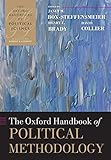The Oxford handbook of political methodology / edited by Janet M. Box-Steffensmeier, Henry E. Brady and David Collier.
Material type: TextSeries: The Oxford handbooks of political science©2008 Description: xiii, 880 pages : illustrations ; 26 cmContent type: text Media type: unmediated Carrier type: volumeISBN: 9780199585564 (paperback)Subject(s): Political science -- Methodology -- Handbooks, manuals, etcLOC classification: JA71 .O94 2010Online resources: Contributor biographical information Contributor biographical information | Publisher description Publisher description | Table of contents Table of contents only | Contributor biographical information Contributor biographical information | Publisher description Publisher description | Table of contents Table of contents only Summary: Political methodology has changed dramatically over the past thirty years, and many new methods and techniques have been developed. Both the Political Methodology Society and the Qualitative/Multi-Methods Section of the American Political Science Association have engaged in ongoing research and training programs that have advanced quantitative and qualitative methodology. The Oxford Handbook of Political Methodology presents and synthesizes these developments. The Handbook provides comprehensive overviews of diverse methodological approaches, with an emphasis on three major themes. First, specific methodological tools should be at the service of improved conceptualization, comprehension of meaning, measurement, and data collection. They should increase analysts' leverage in reasoning about causal relationships and evaluating them empirically by contributing to powerful research designs. Second, the authors explore the many different ways of addressing these tasks: through case-studies and large-n designs, with both quantitative and qualitative data, and via techniques ranging from statistical modelling to process tracing. Finally, techniques can cut across traditional methodological boundaries and can be useful for many different kinds of researchers. Many of the authors thus explore how their methods can inform, and be used by, scholars engaged in diverse branches of methodology.
TextSeries: The Oxford handbooks of political science©2008 Description: xiii, 880 pages : illustrations ; 26 cmContent type: text Media type: unmediated Carrier type: volumeISBN: 9780199585564 (paperback)Subject(s): Political science -- Methodology -- Handbooks, manuals, etcLOC classification: JA71 .O94 2010Online resources: Contributor biographical information Contributor biographical information | Publisher description Publisher description | Table of contents Table of contents only | Contributor biographical information Contributor biographical information | Publisher description Publisher description | Table of contents Table of contents only Summary: Political methodology has changed dramatically over the past thirty years, and many new methods and techniques have been developed. Both the Political Methodology Society and the Qualitative/Multi-Methods Section of the American Political Science Association have engaged in ongoing research and training programs that have advanced quantitative and qualitative methodology. The Oxford Handbook of Political Methodology presents and synthesizes these developments. The Handbook provides comprehensive overviews of diverse methodological approaches, with an emphasis on three major themes. First, specific methodological tools should be at the service of improved conceptualization, comprehension of meaning, measurement, and data collection. They should increase analysts' leverage in reasoning about causal relationships and evaluating them empirically by contributing to powerful research designs. Second, the authors explore the many different ways of addressing these tasks: through case-studies and large-n designs, with both quantitative and qualitative data, and via techniques ranging from statistical modelling to process tracing. Finally, techniques can cut across traditional methodological boundaries and can be useful for many different kinds of researchers. Many of the authors thus explore how their methods can inform, and be used by, scholars engaged in diverse branches of methodology.
| Item type | Current library | Shelving location | Call number | Copy number | Status | Date due | Barcode |
|---|---|---|---|---|---|---|---|
| Books | MEF Üniversitesi Kütüphanesi | Genel Koleksiyon | JA 71 .O94 2010 (Browse shelf (Opens below)) | Available | 0003486 |
Includes bibliographical references and indexes.
Political methodology has changed dramatically over the past thirty years, and many new methods and techniques have been developed. Both the Political Methodology Society and the Qualitative/Multi-Methods Section of the American Political Science Association have engaged in ongoing research and training programs that have advanced quantitative and qualitative methodology. The Oxford Handbook of Political Methodology presents and synthesizes these developments. The Handbook provides comprehensive overviews of diverse methodological approaches, with an emphasis on three major themes. First, specific methodological tools should be at the service of improved conceptualization, comprehension of meaning, measurement, and data collection. They should increase analysts' leverage in reasoning about causal relationships and evaluating them empirically by contributing to powerful research designs. Second, the authors explore the many different ways of addressing these tasks: through case-studies and large-n designs, with both quantitative and qualitative data, and via techniques ranging from statistical modelling to process tracing. Finally, techniques can cut across traditional methodological boundaries and can be useful for many different kinds of researchers. Many of the authors thus explore how their methods can inform, and be used by, scholars engaged in diverse branches of methodology.
1
